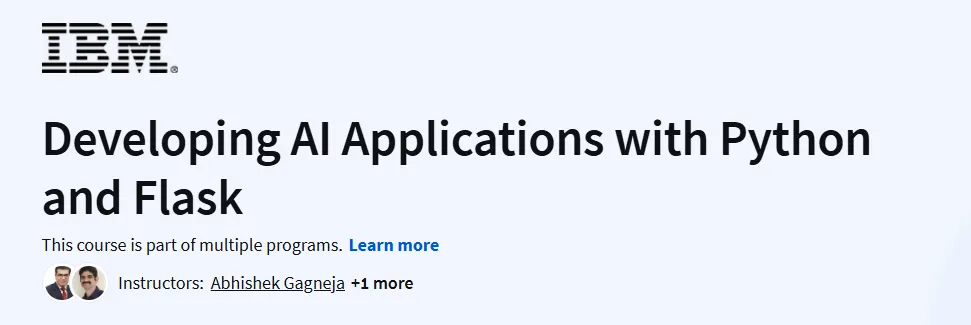What will you learn in this Developing AI Applications with Python and Flask Course
Python Application Development: Understand the steps involved in creating a Python application, including the application development lifecycle.
Coding Best Practices: Create Python modules, run unit tests, and package applications while adhering to PEP8 coding standards.
Flask Framework: Learn the features of Flask and how to deploy applications on the web using this framework.
AI Integration: Develop and deploy AI-based applications onto web servers using IBM Watson AI Libraries and Flask
Program Overview
1. Python Coding Practices and Packaging Concepts
⏳ 3 hours
This module covers the basics of web applications and APIs, the application development lifecycle, PEP8 coding standards, static code analysis, unit testing, and Python packaging.
2. Web App Deployment using Flask
⏳ 4 hours
Learn about Python libraries and frameworks, with a focus on Flask for web deployment. Topics include routes, request and response objects, error handling, decorators, and deploying web apps using Flask.
3. Creating AI Application and Deploy using Flask
⏳ 4 hours
This module introduces Embeddable Watson AI libraries. You’ll build two AI-based apps: a practice project and a final project, applying programming skills and incorporating IBM Watson libraries to build a text-based Sentiment Analysis tool.
Get certificate
Job Outlook
Career Advancement: Equips learners for roles such as AI Developer, Python Developer, and Full Stack Developer.
Industry Relevance: Applicable across sectors like technology, healthcare, finance, and e-commerce.
Skill Enhancement: Enhances capabilities in AI application development, web development, and software engineering
Specification: Developing AI Applications with Python and Flask Course
|
FAQs
- No, deep prior experience isn’t required, but basic Python programming is essential.
- The course introduces AI concepts at a practical level, so you’ll learn while building.
- Familiarity with data handling (NumPy, Pandas) helps but isn’t mandatory.
- Flask is lightweight and flexible, making it ideal for quick AI model deployment.
- Django is more feature-rich but can be heavier for simple AI prototypes.
- Flask allows you to integrate machine learning models with fewer dependencies.
- Yes, Flask applications can be deployed on platforms like AWS, Heroku, or Google Cloud.
- You’ll just need basic knowledge of containers (Docker) or hosting services.
- This ensures your AI apps go beyond local testing and become production-ready.
- AI chatbots with natural language processing.
- Image recognition web apps for classification or detection.
- Recommendation systems for e-commerce or content platforms.
- Predictive analytics dashboards using machine learning models.
- Yes, Flask is widely used for deploying machine learning and deep learning models.
- It bridges the gap between data science experiments and real-world applications.
- Adding Flask + AI skills to your portfolio boosts your chances in AI/ML engineering, data science, and backend development roles.





